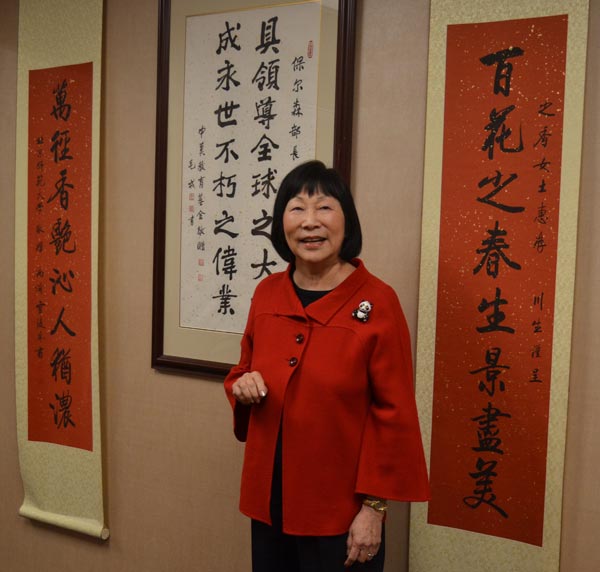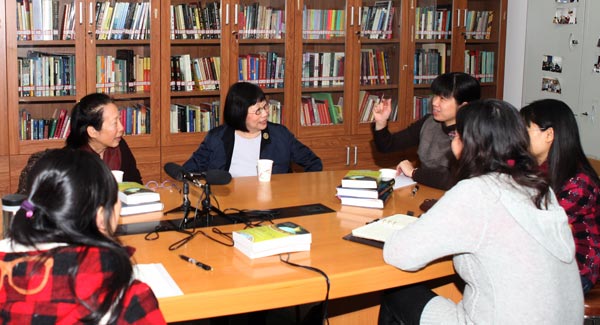Julia Chang Bloch: breaking barriers, building bridges
Updated: 2015-02-06 11:28
By Cai Chunying and Huashengdun in Washington(China Daily USA)
|
|||||||||
|
Julia Chang Bloch, president of US-China Education Trust and former US ambassador to Nepal, stands in front of a pair of calligraphy poem strolls in her office in Washington DC. The poem artfully connotes the meaning of her Chinese name. Cai Chunying / China Daily |
In Julia Chang Bloch's view, the mission she carries now as the president of US-China Education Trust (USCET) is a continuation of a theme that has accentuated her life: breaking barriers.

A first-generation Chinese American who immigrated to the US at nine, Bloch, in 1989, rose to become the first Asian-American ambassador - 22 years before Gary Locke became US ambassador to China, after ascending through a series of US government posts that were rarely held by Asian Americans, breaking barriers one after another.
For the past 17 years, Bloch has devoted herself to breaking barriers much larger than the ones in her own career path - the barriers between China and the United States.
"Friendship between China and the United States would always be difficult and US-China relations would always go up and down because we are so different," Bloch told China Daily in an interview in her office on K Street, a thoroughfare of world-class think tanks and lobbyists in the US capital.
"Therefore helping the two countries understand each other is even more important. This is why I started USCET," said Bloch, calling the relationship "the most important one of the 21st century".
In Bloch's view, there are many American think tanks working on "helping Americans understand China", but not vice versa.
"China's US experts know less about America than the American experts know about China," she said. "They often are looking at current events, but how do you understand US-China relations if you don't understand America's history, society and religion?"
This is why Bloch chose strengthening American Studies in China as the primary focus when she launched USCET in 1998, with the goal of "teaching China's next generation about the US".
With its support, flocks of Chinese scholars and students have travelled to the US to attend seminars and workshops. American experts have also travelled to China to teach and communicate.
Finding self
USCET is an offspring of the F.Y. Chang Foundation, endowed by Bloch and her lawyer husband, Stuart Marshall Bloch, in 1983 to commemorate her father, Fuyun Chang, a legend of his times.
Sent to Harvard from Tsinghua University, Chang became the first Chinese graduate of Harvard Law School in 1917.
Upon returning to China, Chang served as director general of the Chinese Maritime Customs Service, playing a central role in returning customs authority to Chinese control from foreign powers. He also represented China during negotiations leading to the founding of the United Nations.
Chang left China in 1949 during the regime change. Two years later, the rest of the family followed.
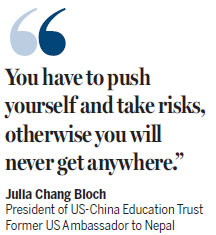
Bloch still remembers first seeing a water fountain on the boat coming to the US and was told it was quite common in America, she was so delighted and couldn't help but think "a country where water just comes out of a spout or jet must be a good place".
The start-from-scratch life did not defeat the family. Bloch's mother, a lady from cosmopolitan Shanghai, made a living by simultaneously doing three jobs and eventually owning a restaurant.
"She had true grit," recalled Bloch, who was born into wealth in Yantai, Shandong province, a northeast coastal city. "She showed me that everything is possible as long as you work hard."
Bloch said it was however her father who propelled her to succeed.
"I am much more of my father's daughter. He instilled in me that you can always be better," said Bloch, whose Chinese name, Zhang Zhixiang, means fragrance of the Chang (Zhang) family.
"But again, the common denominator was you must work hard," she added.
Bloch said her father told his children they must do two things in the US: speak perfect English and be part of the mainstream.
She was first placed in a class for the mentally retarded, but was soon transferred to a regular one when she learned to speak English and could display her social ability and talents in schoolwork.
As the first child of the family, Bloch kept fulfilling her father's expectations one after another. She was confident and self-motivated enough to win election to be president of her sixth grade class, a rare thing for girl students then, not to mention a Chinese-American girl.
With excellent school report cards and test scores, Bloch entered the University of California, Berkeley in 1960, majoring in communications and public policy.
"I have always been interested in history and politics," said Bloch. "And my father supported my choice even though most Chinese parents then wanted their children to enter science or technology fields to secure a job."
The identity struggle of being a Chinese or an American and her longing for her motherland, however, never left the girl. Upon graduation in 1964, Bloch joined the Peace Corps, a program established by the US President John F. Kennedy to encourage US youth to provide volunteer service in developing world.
"I wanted to find out who I am, a Chinese or an American," recalled Bloch.
The two-year teaching experience in a local Chinese junior high school in Sabah, Malaysia, the closest place to China she could find, not only helped Bloch see her true self but solidified her vision for her own life.
"One of my brightest students told me, 'Miss Julia, you are different, you are more like a Chinese boy'," Bloch said, explaining that the student was comparing her with Chinese girls in the village who were obedient and rarely expressed personal views while boys were encouraged to do otherwise.
"So when I came back, I knew that I was more American than Chinese," Bloch said, "And I knew I also had the best of both worlds."
"You have to know yourself. This is the beginning of a successful life," she said.
Building path
Preparing for her own career path and also to fulfill her father's dream for his children to go to Harvard, Bloch went to the Ivy League school, earning her Master's degree in government and East Asian regional studies in 1967 on a Ford fellowship.
Determined to start from the US Senate upon graduation but refusing to take the kind of clerical jobs that women usually did at the time, Bloch knocked on hundreds of doors on Capitol Hill and eventually got the position she wanted - a professional staff member. She worked for Senator Charles Percy of Illinois, a ranking member of the Senate Select Committee on Nutrition and Human Needs.
The job was eye opening for Bloch. She was given the responsibility to cover practically all domestic issues for the senator.
"Senator Percy also knew my interest in international affairs and gave me opportunities to do international things as well," said Bloch, whose ventures extended to attending the first International Women's Conference in Mexico City in 1975.
"I was about the only Asian American in the US Congress that anybody could see," said Bloch. She became the minority staff director for the committee in 1976.
After the committee was absorbed by another bigger one, Bloch was offered a job by the US Information Agency as deputy director of African affairs. The job was in the field of public diplomacy, which Bloch liked.
Eager to learn new things and go beyond herself, Bloch, however, left the agency after three years and returned to Harvard upon being offered a fellowship at the Institute of Politics, which usually only invites prominent politicians.
"You have to push yourself and take risks, otherwise you will never get anywhere," recalled Bloch of her choice to leave government.
Coming out of Harvard refreshed, Bloch was recruited by the US Agency for International Development (USAID) in 1981 as Assistant Administrator for Food for Peace and Voluntary Assistance, a position appointed by the US President and confirmed by the Senate.
By then, Bloch had become one of the highest-ranking Asian Americans and women in the Reagan Administration. Her father was able to watch her Senate confirmation before passing away in 1983.
Bloch stayed at USAID for the next seven years, also taking the post of assistant administrator for Asia and the Near East. In 1988, she again left government and returned to Harvard, preparing for her next career move. This time she concentrated on doing research on the relations between the US and Japan, two countries that rival each other in international aid.
While at Harvard's Center of International Affairs, Bloch had the peak moment of her career. She was nominated by president George H. W. Bush to be the first Asian-American ambassador, dispatched to Nepal, a country neighboring China and heavily dependent on foreign aid.
Recalling the historic moment, Bloch said although an ambassadorship was what she had always dreamed for herself, the announcement came as a surprise.
"I did not expect this," she said. "I guess I was at the right place at the right time. The US was ready for an Asian-American ambassador and there I was," said Bloch.
"It was an ideal post for me. I had been training all my life for the job," she added.
During the four-year term, the ambassador traveled all around the country. Of Asian appearance and capable of speaking some Nepali, in remote villages she was often mistaken as a local by the Nepalese.
On fulfilling her term, Bloch jumped into a completely different world - the Bank of America - as executive vice-president in charge of its public relations and government affairs for the next three years. Bloch said she just wanted to taste what the corporate world was like and soon found her heart did not belong there.
She then moved to the United States-Japan Foundation, serving as its president and CEO for another three years, which she had prepared herself well for at Harvard.
"Change is so difficult for many people, but I have always very much welcome change. Once I have been there and done that, I want to move on," said Bloch, whose office was filled with art pieces that are bold and bright, reflecting the owner's approach.
Coming home
In 1998, a call from Peking University, a place where her father lectured, brought Bloch back to China. Her first trip there was in 1977 as a member of the first delegation of the American Council of Young Political Leaders. She was the only Chinese American on the team.
This time it was different. It was a call from her motherland. The most esteemed university in China asked her to come for its centennial celebration.
"It was like coming home, full circle," said Bloch. "I stayed and never left."
To Bloch's surprise, the university wanted her not only for the ceremonial moment, but for a true undertaking that would demand tons of work. They asked her to rebuild the American Studies program and its center.
Without hesitation, Bloch, with the titles of visiting professor and the center's vice-chairman, worked tirelessly with prominent scholars and promising students there for selected periods until 2001, when she joined Fudan University in Shanghai.
During the process, she also found her destiny again, establishing an organization of her own, promoting understanding between the US and China.
"It was an opportunity for me to do something for US-China relations, something that I felt qualified to do," the ambassador-turned scholar said. "I'm glad I decided not to work for anyone anymore, but to create USCET (US-China Education Trust)."
USCET first set out to deepen knowledge about the US in China by enriching the field of American studies there. Over the years, it has built about a dozen programs as well as an American Studies Network, which includes more than 50 major Chinese academic institutions that offer American Studies. The annual conference it launched in 2004 has become one of the most prominent meetings of American Studies experts in China.
"I do believe we have made inroads in American Studies," said Bloch. "You can just tell from the papers we receive. The quality is much better."
|
Julia Chang Bloch (third from left), president of US-China Education Trust (USCET) and former US ambassador to Nepal, and Gish Jen (second from left), acclaimed Chinese American writer, speak with scholars and students at USCET's American Cultural Center at Beijing Foreign Studies University in 2012. Provided to China Daily |
Among the many subjects USCET covers, it has stressed one domain in particular - American governance, which provides insights into the US political system.
USCET has brought top US officials, current lawmakers, and political analysts to China to decipher American congressional process and presidential elections. Chinese students and faculty are also invited to attend live party conventions and presidential debates in the US.
Inspired by the pivotal role media has played in American society, USCET developed programs devoted to media education to help Chinese journalists and journalism students master news-making skills.
Its Journalist-in-Residence program has sponsored prominent journalists such as Washington Post's Pulitzer Prize-winning reporter David Broder and PBS broadcaster Gwen Ifill, who has hosted the US Vice-Presidential Debate.
USCET also has provided impoverished Chinese students better educational opportunities. More than 100 students from five universities have received financial aid from the organization since 2007.
Organizing the first program to be launched under US President Barack Obama's "100,000 Strong" Initiative, USCET's Student Leaders Exchange program provided grants to American universities to encourage students to study in China.
In the meantime, The F.Y. Chang Foundation, parent of USCET, has helped more than 60 Chinese students earn Harvard Law degrees, some of whom have become influential judges, attorneys, professors and legal experts in China. It also hosts annual lectures, inviting prominent scholars to share their expertise in advancing the rule of law in China.
It is hard to imagine the more than two dozen programs hosted by both entities all came out of a small team of three, Bloch and her two staff. Glancing through the names of the renowned speakers and supporters Bloch has brought to her cause, one knows that Bloch has made good use of the connections and resources she built up over her many years of breaking barriers through substantive work in the US government and non-profit world.
"America's modern history has been my entire life, so to be part of that has been very uplifting and has also been an impetus for my wanting to do more for not just Chinese but Asian Americans in this country," Bloch said.
For her, what she has devoted herself to is also a way to pay tribute to her father.
"He always wanted me to be my best," said Bloch, "This has always stayed with me."
In her 70s, Bloch looks energetic and graceful with her sharply bobbed haircut. She was selected in 2011 by the American magazine Women of Wealth as "one of the nation's top 87 women mentoring leaders". Bloch was the only Asian American on the list, also listed are US First Lady Michelle Obama and Associate Supreme Court Justice Sonia Sotomayor.
"I have always looked to my own potential. This has been very satisfying. America has allowed me to achieve most of my potential," Bloch said.
"By being Chinese in America, I feel I can be a better bridge between China and the United States," she added.
Contact the authors at charlenecai@chinadailyusa.com.
Sheng Yang in Washington contributed to this story.

 International rescue teams head to quake-hit Nepal
International rescue teams head to quake-hit Nepal
 World's deadliest earthquakes since 1900s
World's deadliest earthquakes since 1900s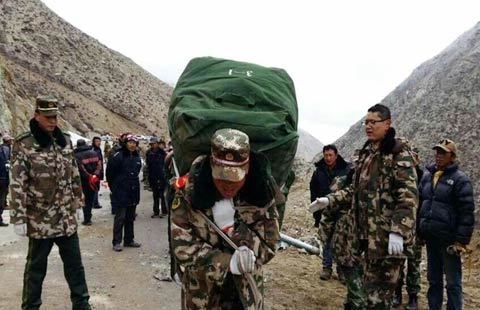
 Rescuers deliver relief supplies on foot
Rescuers deliver relief supplies on foot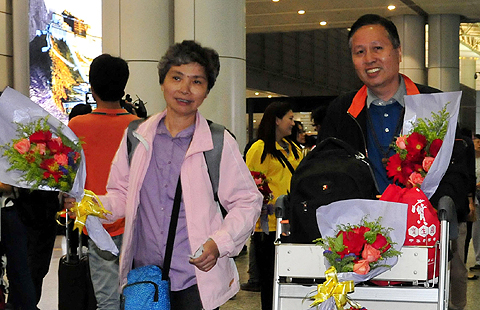
 China brings trapped nationals home from quake-hit Nepal
China brings trapped nationals home from quake-hit Nepal
 Severe drought hits Southwest China
Severe drought hits Southwest China
 History razed in Nepal earthquake
History razed in Nepal earthquake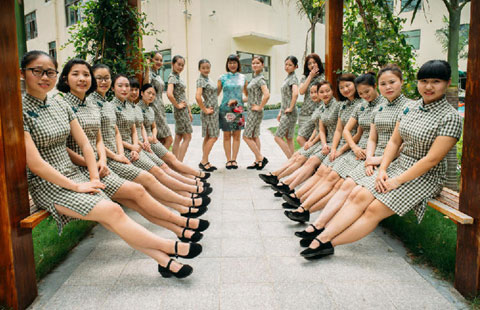
 'Chi-pao teachers' found in Guangdong
'Chi-pao teachers' found in Guangdong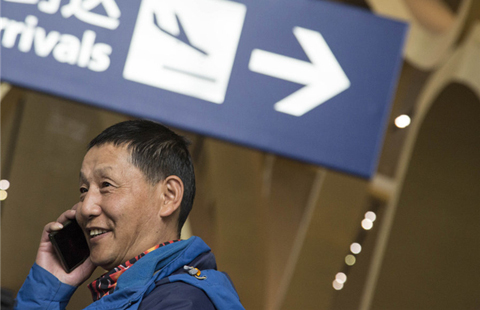
 Tourists evacuated from Nepal quake area arrive in Kunming
Tourists evacuated from Nepal quake area arrive in Kunming
Most Viewed
Editor's Picks

|

|

|

|

|

|
Today's Top News
Chinese, Koreans seek Japan apology
China rescue team starts work
Three US citizens among dead in avalanche after Nepal quake
Chinese rally across US to support NYC police officer under indictment
New publication will focus on China's energy industry
Abe's US trip: sense or sensibility?
China to overtake US in mobile gaming market
Nearly 2,500 confirmed dead in Nepal quake
US Weekly

|

|
